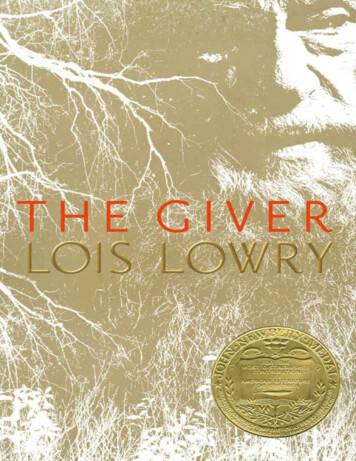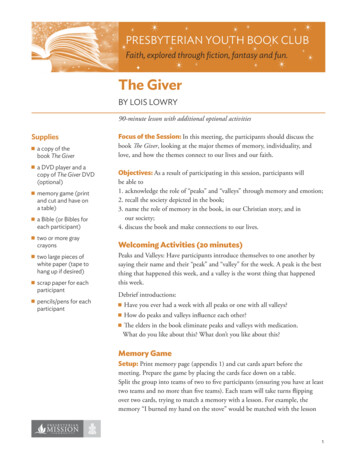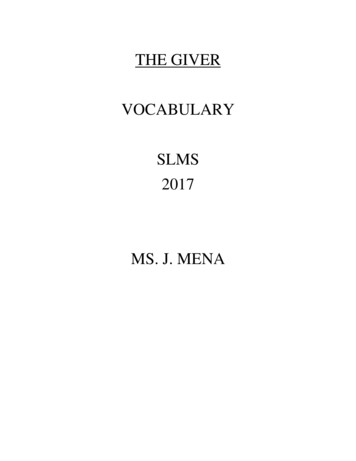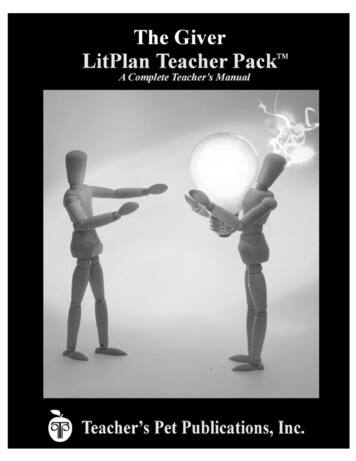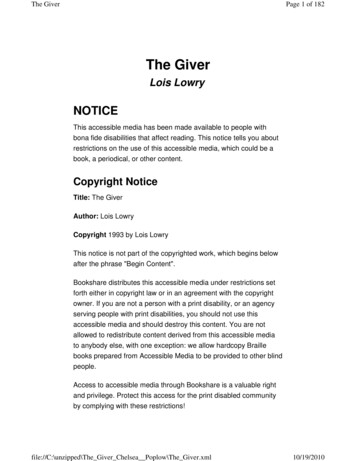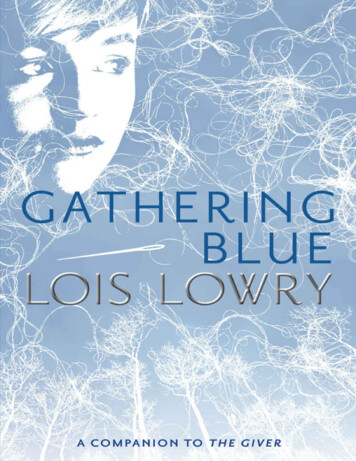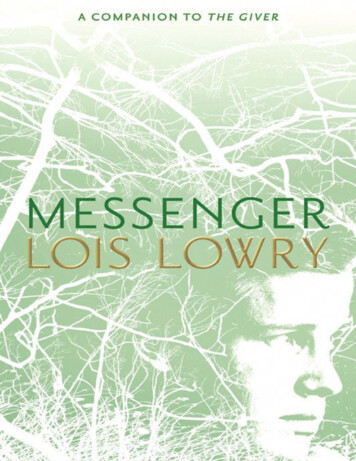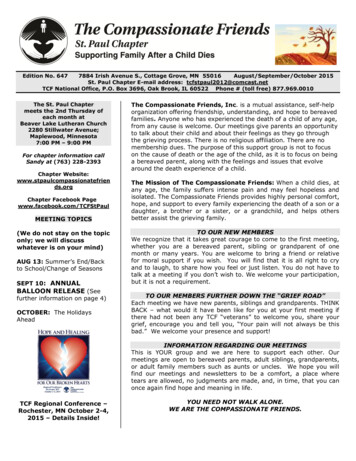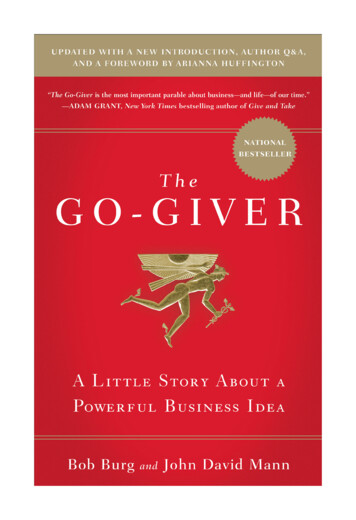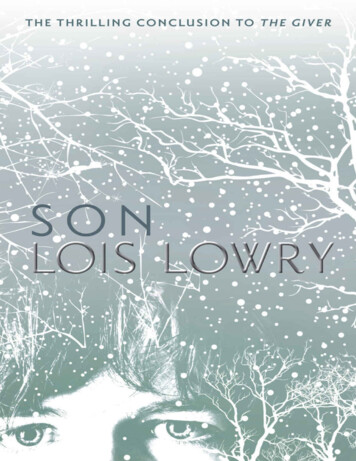
Transcription
ContentsTitle PageContentsCopyrightDedicationBook veThirteenFourteenFifteenSixteenBook lveThirteenFourteenFifteenSixteenBook IIIOneTwoThree
FourFiveSixSevenEightNineTenElevenTwelveThirteenA Guide for Discussion and Classroom UseThe Giver QuartetAbout the Author
Copyright 2012 by Lois LowryAll rights reserved. For information about permission to reproduce selections from this book, write toPermissions, Houghton Mifflin Harcourt Publishing Company, 215 Park Avenue South, New York,New York 10003.www.hmhco.comThe Library of Congress has cataloged the print edition as follows:Lowry, Lois.Son / by Lois Lowry.p. cm.Companion book to: The Giver, Gathering blue, and Messenger.Summary: Unlike the other Birthmothers in her utopian community, teenaged Claire forms anattachment to her baby, feeling a great loss when he is taken from their community.ISBN 978-0-547-88720-3[1. Science fiction. 2. Mother and child—Fiction. 3. Separation (Psychology)—Fiction.] I. Title.PZ7.L9673So 2012[Fic]—dc232012014034eISBN 978-0-547-92851-7v4.0315
In memory of Martin
Book IBefore
OneThe young girl cringed when they buckled the eyeless leather mask around the upper half of her faceand blinded her. It felt grotesque and unnecessary, but she didn’t object. It was the procedure. Sheknew that. One of the other Vessels had described it to her at lunch a month before.“Mask?” she had asked in surprise, almost chuckling at the strange image. “What’s the mask for?”“Well, it’s not really a mask,” the young woman seated on her left corrected herself, and tookanother bite of the crisp salad. “It’s a blindfold, actually.” She was whispering. They were notsupposed to discuss this among themselves.“Blindfold?” she had asked in astonishment, then laughed apologetically. “I don’t seem to be ableto converse, do I? I keep repeating what you say. But: blindfold? Why?”“They don’t want you to see the Product when it comes out of you. When you birth it.” The girlpointed to her bulging belly.“You’ve produced already, right?” she asked her.The girl nodded. “Twice.”“What’s it like?” Even asking it, she knew it was a somewhat foolish question. They had hadclasses, seen diagrams, been given instructions. Still, none of that was the same as hearing it fromsomeone who had already gone through the process. And now that they were already disobeying therestriction about discussing it—well, why not ask?“Easier the second time. Didn’t hurt as much.”When she didn’t respond, the girl looked at her quizzically. “Hasn’t anyone told you it hurts?”“They said ‘discomfort.’”The other girl gave a sarcastic snort. “Discomfort, then. If that’s what they want to call it. Not asmuch discomfort the second time. And it doesn’t take as long.”“Vessels? VESSELS!” The voice of the matron, through the speaker, was stern. “Monitor yourconversations, please! You know the rules!”The girl and her companion obediently fell silent then, realizing they had been heard through themicrophones embedded in the walls of the dining room. Some of the other girls giggled. They wereprobably also guilty. There was so little else to talk about. The process—their job, their mission—was the thing they had in common. But the conversation shifted after the stern warning.She had taken another spoonful of soup. Food in the Birthmothers’ Dormitory was always plentifuland delicious. The Vessels were all being meticulously nourished. Of course, growing up in thecommunity, she had always been adequately fed. Food had been delivered to her family’s dwellingeach day.But when she had been selected Birthmother at twelve, the course of her life had changed. It hadbeen gradual. The academic courses—math, science, law—at school became less demanding for hergroup. Fewer tests, less reading required. The teachers paid little attention to her.Courses in nutrition and health had been added to her curriculum, and more time was spent onexercise in the outdoor air. Special vitamins had been added to her diet. Her body had beenexamined, tested, and prepared for her time here. After that year had passed, and part of another, shewas deemed ready. She was instructed to leave her family dwelling and move to the Birthmothers’Dormitory.Relocating from one place to another within the community was not difficult. She owned nothing.Her clothing was distributed and laundered by the central clothing supply. Her schoolbooks were
requisitioned by the school and would be used for another student the following year. The bicycle shehad ridden to school throughout her earlier years was taken to be refurbished and given to a different,younger child.There was a celebratory dinner her last evening in the dwelling. Her brother, older by six years,had already gone on to his own training in the Department of Law and Justice. They saw him only atpublic meetings; he had become a stranger. So the last dinner was just the three of them, she and theparental unit who had raised her. They reminisced a bit; they recalled some funny incidents from herearly childhood (a time she had thrown her shoes into the bushes and come home from the ChildcareCenter barefoot). There was laughter, and she thanked them for the years of her upbringing.“Were you embarrassed when I was selected for Birthmother?” she asked them. She had, herself,secretly hoped for something more prestigious. At her brother’s selection, when she had been just six,they had all been very proud. Law and Justice was reserved for those of especially keen intelligence.But she had not been a top student.“No,” her father said. “We trust the committee’s judgment. They knew what you would do best.”“And Birthmother is very important,” Mother added. “Without Birthmothers, none of us would behere!”Then they wished her well in the future. Their lives were changing too; parents no longer, theywould move now into the place where Childless Adults lived.The next day, she walked alone to the dormitory attached to the Birthing Unit and moved into thesmall bedroom she was assigned. From its window she could see the school she had attended, and therecreation field beyond. In the distance, there was a glimpse of the river that bordered the community.Finally, several weeks later, after she was settled in and beginning to make friends among the othergirls, she was called in for insemination.Not knowing what to expect, she had been nervous. But when the procedure was complete, she feltrelieved; it had been quick and painless.“Is that all?” she had asked in surprise, rising from the table when the technician gestured that sheshould.“That’s all. Come back next week to be tested and certified.”She had laughed nervously. She wished they had explained everything more clearly in theinstruction folder they had given her when she was selected. “What does ‘certified’ mean?” sheasked.The worker, putting away the insemination equipment, seemed a little rushed. There were probablyothers waiting. “Once they’re sure it implanted,” he explained impatiently, “then you’re a certifiedVessel.“Anything else?” he asked her as he turned to leave. “No? You’re free to go, then.”That all seemed such a short time ago. Now here she was, nine months later, with the blindfoldstrapped around her eyes. The discomfort had started some hours before, intermittently; now it wasnonstop. She breathed deeply as they had instructed. It was difficult, blinded like this; her skin washot inside the mask. She tried to relax. To breathe in and out. To ignore the discom—No, she thought.It is pain. It really is pain. Gathering her strength for the job, she groaned slightly, arched her back,and gave herself up to the darkness.Her name was Claire. She was fourteen years old.
TwoThey clustered around her. She could hear them, when her mind was able to focus through the surgingintermittent pain. They were talking urgently to each other. Something was wrong.Again and again they checked her with their instruments, metallic and cold. A cuff on her arm wasinflated, and someone pressed a metal disk there, at her elbow. Then a different device against herstretched and shaking belly. She gasped as another convulsive pain ripped through her. Her handswere tied on either side of the bed. She was unable to move.Was it supposed to be like this? She tried to ask but her voice was too weak—mumbly and scared—and no one heard.“Help me,” she whimpered. But their attention, she sensed, was not on her, not really. They wereworried about the Product. Their hands and tools were on her taut middle. It had been hours, now,since all this began, the first twinge, then the rhythmic, hardening pain, and later, the buckling on ofthe mask.“Put her out. We’ll have to go in for it.” It was a commanding voice, clearly someone in charge.“Quickly.” There was a startling urgency to it.“Breathe deeply,” they ordered her, shoving something rubbery up under the mask, holding it to hermouth and nose. She did. She had no choice. She would have suffocated otherwise. She inhaledsomething with an unpleasantly sweet scent, and immediately the pain subsided, her thoughtssubsided, her being drifted away. Her last sensation was the awareness, pain-free, of somethingcutting into her belly. Carving her.She emerged to a new, different pain, no longer the throbbing agony but now a broad, deep ache. Shefelt freed, and realized that her wrists were unshackled. She was still on the bed, covered with awarm blanket. Metal rails had been lifted with a clanking sound, so she was protected on either side.The room was empty now. No attendants or technicians, no equipment. Only Claire, alone. She turnedtentatively, assessing the emptiness of the room with her eyes, and then tried to lift her head but wasforced back by the pain the attempt caused. She couldn’t look down at her own body but carefullymoved her hands to rest there on what had been her own taut, swollen belly. It was flat now,bandaged, and very sore. The Product was what they had carved out of her.And she missed it. She was suffused with a desperate feeling of loss.“You’ve been decertified.”Three weeks had passed. She had recuperated in the Birthing Unit for the first week, tended andchecked—pampered a bit, actually, she realized. But there was an awkwardness to everything. Therewith her were other young women, recovering, so there was pleasant conversation, a few jokes aboutbeing slender again. Their bodies, hers as well, were massaged each morning, and their gentleexercise was supervised by the staff. Her recuperation was slower, though, than the others’, for shehad been left with a wound and they had not.After the first week they were moved to an interim place, where they amused themselves with talkand games before returning two weeks later to the large, familiar group of Vessels. Back they went, tothe Dormitory, greeting old friends—many of them larger in size now, their bellies growing as theywaited—and taking their places again in the group. They all looked alike, in their shapeless,smocklike dresses, with their identical haircuts; but personalities distinguished them. Nadia was
funny, making a joke of everything; Miriam very solemn and shy; Suzanne was organized and efficient.As Vessels returned following Production, there was surprisingly little talk of the Task. “How didit go?” someone would ask, and the reply would be a nonchalant shrug, and “All right. Fairly easy.”Or a wry “Not too bad,” with a face indicating that it had not been pleasant.“Good to have you back.”“Thanks. How were things here while I was gone?”“The same. Two new Vessels, just arrived. And Nancy’s gone.”“What did she get?”“Farm.”“Good. She wanted that.”It was casual talk, inconsequential. Nancy had delivered her third Product not long before. Afterthe third, the Vessels were reassigned. Farm. Clothing Factory. Food Delivery.Claire remembered that Nancy had hoped for Farm. She liked the outdoors, and a particular friendof hers had been assigned Farm some months before; she hoped to spend the next part of her workinglife in the company of someone she enjoyed. Claire felt happy for her.But she was apprehensive about her own future. Although her memory was hazy, she knew thatsomething had gone wrong at her own Production. It was clear that no one else had ended up with awound. She had tried, somewhat shyly, to ask the others, those who had produced more than once. Butthey seemed shocked and confused by her questions.“Is your belly still sore?” Claire whispered to Miriam, who had been in the recuperation placewith her.“Sore? No,” Miriam had replied. They were sitting beside each other at breakfast.“Mine is, just where the scar is. When I press on it,” Claire explained, touching her hand gently tothe place.“Scar?” Miriam made a face. “I don’t have a scar.” She turned away and joined anotherconversation.Claire tried again, carefully asking a few other Vessels. But no one had a scar. No one had awound. After a while, her own ache subsided, and she tried to ignore the uneasy awareness thatsomething had gone very wrong.Then she was called in. “Claire,” the voice from the speaker announced at midday while theVessels were eating, “please report to the office immediately after lunch.”Flustered, Claire looked around. Across the table was Elissa, a special friend. They had beenselected the same year, both Twelves at the same time, and so she had known Elissa through herschool years. But Elissa was newer here; she had not been inseminated as soon as Claire. Now shewas in the early stages of her first Production.“What’s that about?” Elissa asked her when they heard the directive.“I don’t know.”“Did you do something wrong?”Claire frowned. “I don’t think so. Maybe I forgot to fold my laundry.”“They wouldn’t call you in for that, would they?”“I don’t think so. It’s so minor.”“Well,” Elissa said, beginning to stack her empty dishes, “you’ll find out soon enough. It’sprobably nothing. See you later!” She left Claire still sitting at the table.But it was not nothing. Claire stood facing them in dismay as the committee told her of theirdecision. She had been decertified.
“Gather your things,” they told her. “You’ll be moved this afternoon.”“Why?” she asked. “Was it because . . . well, I could tell that something went wrong, but I . . .”They were kind, solicitous. “It wasn’t your fault.”“What wasn’t my fault?” she asked, aware that she shouldn’t press them but unable to stop herself.“If you could just explain . . . ?”The committee head shrugged. “These things happen. A physical problem. It should have beendetected sooner. You should not have been inseminated. Who was your first Examiner?” he asked.“I don’t remember her name.”“Well, we’ll find out. Let’s hope it was her first error, so that she will have another chance.”They dismissed her then, but she turned at the door because she could not leave without asking.“My Product?”He looked at her dismissively, then relented. He turned to another committee member near him atthe table and nodded to the papers in front of her, directing her to look up the information.“What number was it?” the woman asked him, but he ignored the question. “Well,” she said, “I’llcheck by name. You’re—Claire?”As if they didn’t know. They had summoned her here by name. But she nodded.She moved her finger down a page. “Yes. Here you are. Claire: Product number Thirty-six. Oh yes,I see the notations about the difficulties.”She looked up. Claire touched her own belly, remembering.The woman returned the paper to the pile and tapped the edges of the stack to make it tidy. “He’sfine,” she said.The committee head glared at her.“It.” She corrected herself. “I meant that it’s fine. The medical difficulties didn’t affect it.“You’ll be fine too, Claire,” she added, affably.“Where am I going?” Claire asked. Suddenly she was frightened. They hadn’t yet said she wasbeing reassigned. Just decertified. So she would no longer be a Birthmother. That made sense. Herbody had not performed that function well. But what if—? What if decertified people were simplyreleased? The way failures often were?But their reply was reassuring. “Fish Hatchery,” the committee head told her. “You’re being movedthere. They need help; they’re short of workers. Your training will start in the morning. You’ll have tocatch up. Luckily you have a quick mind.”He dismissed her now with a wave of his hand, and Claire went back to the Dormitory to gatherher few things. It was rest time. The other Vessels were all napping, the doors to their cubicle-likerooms closed.He, she thought as she packed the few personal items that she had. It was a he. I produced a babyboy. I had a son. The feeling of loss overwhelmed her again.
ThreeYou’ll be issued a bicycle.” The man—his name-tag said DIMITRI, HATCHERY SUPERVISOR—gesturedtoward the area where bicycles were standing in racks. He had met her at the door, unsurprised by herarrival. Obviously he had been notified that she was on her way.Claire nodded. Confined to the Birthing Unit and its surrounding grounds for over a year now, shehad not needed any kind of transportation. And she had walked here, carrying her small case ofbelongings, from the Birthmothers’ area to the northeast. It wasn’t far, and she knew the route, butafter so many months, everything seemed new and unfamiliar. She had passed the school and sawchildren at their required exercise in the recreation field. None seemed to recognize her, though theylooked curiously at the young woman walking along the path at midday. It was unusual. Most peoplewere at their jobs. Those who needed to be out and about were on bicycles making their way fromone building to another. No one walked. A small girl with hair ribbons grinned at Claire from theexercise routine, and waved surreptitiously; Claire smiled back, remembering her own beribboneddays, but an instructor called sharply to the child, who made a face and turned back to the assignedcalisthenics.Across the Central Plaza, she caught a glimpse, in the Dwelling area, of the small house where shehad grown up. Other people would live there now, couples newly assigned to each other, perhapswaiting for . . .She averted her eyes from the Nurturing Center. It was, she knew, where the Products were takenafter the birthing. Usually in groups. Early morning, most often. Once, sleepless at dawn, she hadwatched from the window of her cubicle and seen four Products, tucked into baskets, loaded into atwo-wheeled cart attached to the back of a bicycle. After checking their security in the cart, thebirthing attendant had ridden off toward the Nurturing Center to deliver them there.She wondered if her own Product, her boy, number Thirty-six, had been taken to the NurturingCenter yet. Claire knew that they waited—sometimes days, occasionally weeks, making certain thateverything was going well, that the Products were healthy—to make the transfer.Well. She sighed. Time to put it out of her mind. She walked on, past the hall of Law and Justice.Peter, whom she had once known as a teasing older brother, would be inside, at work. If he glancedthrough a window and saw a young woman walking slowly past, would he know it was Claire?Would he care?Past the House of Elders, the place where the governing committee lived and studied. Past smalloffice buildings; past the bicycle repair shop; and now she could see the river that bordered thecommunity, its dark water moving swiftly, foaming around rocks here and there. Claire had alwaysfeared the river. As children they had been warned of its dangers. She had known of a young boy whohad drowned. There were rumors, likely untrue, of citizens who had swum across, or even made theirway across the high, forbidden bridge and disappeared into the unknown lands beyond. But she wasfascinated by it too—its constant murmur and movement, and the mystery of it.She crossed the bike path, waiting politely until two young women had pedaled by. To her left shecould see the shallow fish-holding ponds and remembered how, as younger children, she and herfriends had watched the silvery creatures darting about.Now she would be working here, at the Hatchery. And living here too, she assumed, at least until. . . until when? Citizens were given dwellings when they were assigned spouses. Birthmothers neverhad spouses, so she had not thought about it until now. Now she wondered. Was she eligible now for
a spouse, and eventually for—? Claire sighed. It was troubling, and confusing, to think about suchthings. She turned away from the holding ponds, made her way to the front door of the main building,and was met there by Dimitri.That night, alone in the small bedroom she’d been assigned, Claire looked down from her window tothe darkened, surging river below. She yawned. It had been a long and exhausting day. This morningshe had awakened in her familiar surroundings, the place where she had lived for so many months, butby midday her entire life had shifted. She had not had a chance to say goodbye to her friends, the otherVessels. They would be wondering where she had gone, but would likely forget her soon. She hadtaken her place here, been issued a nametag, and been introduced to the other workers. They seemedpleasant enough. Some, older than Claire, had spouses and dwellings, and left at the end of the day’swork. Others, like herself, lived here, in rooms along the corridor. One, Heather, had been the sameyear as Claire; she had been a Twelve at the same ceremony. Surely she would remember Claire’sAssignment as Birthmother. Her eyes flickered in recognition when they were introduced, but Heathersaid nothing. Neither did Claire. There was nothing really to say.She supposed that she and the younger workers, including Heather, would become friends, of asort. They would sit together at meals and go in groups to attend community entertainments. After awhile they would have shared jokes, probably things about fish, phrases that would make themchuckle. It had been that way with the other Vessels, and Claire found herself missing, already, theeasy camaraderie among them. But she would fit in here. Everyone welcomed her cheerfully and saidthey’d be glad of her help.The work wouldn’t be hard. She had been allowed to watch the lab attendants, in gowns andgloves, strip eggs from what they called the breeder fish, anesthetized females. A little like squeezingtoothpaste, she thought, amused at the image. Nearby, other attendants squeezed what they told herwas “milt” from the male; then they added the creamy substance to the container that held the fresheggs. It had to be very precisely timed, they explained. And antiseptic. They worried aboutcontamination, and bacteria. The temperature made a difference as well. Everything was carefullycontrolled.In a nearby room lit by dim red lights, she had watched another gloved worker look through traysof stacked fertilized eggs.“See those spots?” the worker had asked Claire. She pointed to the tray of glistening pink eggs.Claire peered down and saw that most of them had two dark spots. She nodded.“Eyes,” the girl told her.“Oh,” Claire said, amazed that already, so young and tiny that she could hardly think of it as a fish,it had eyes.“See here?” Using a metal tool, the girl pointed to a discolored, eyeless egg. “This one’s dead.”Carefully she plucked it from the tray with her forceps and discarded it in the sink. Then she returnedthe tray to its rack and reached for the next one.“Why did it die?” Claire asked. She found that she was whispering. The room was so dimly lit, soquiet and cool, that her voice was hushed.But the worker replied in a normal tone, very matter-of-fact. “I don’t know. The insemination wentwrong, I guess.” She shrugged and removed another dead egg from the second tray. “We have to takethem out so they don’t contaminate the good ones. I check them every day.”Claire felt a vague discomfort. The insemination had gone wrong. Was that what had happened toher? Had her Product, like the discolored, eyeless egg, been thrown aside someplace? But no. They
had told her that number Thirty-six was “fine.” She tried to set aside her troubling thoughts and payattention to the worker’s voice and explanations.“Claire?” The door opened and it was Dimitri, the supervisor, looking for her. “I want to show youthe dining room. And they have your schedule almost ready to give you.”So she had continued her tour of the facility, and been instructed in her next day’s duties (cleaning,mostly—everything had to be kept spotless), and later she had had supper with a group of the workerswho lived, as she would now, at the Hatchery. They talked, mostly, about what they had done duringrecreation time. There was an hour allotted each day when they could do whatever they liked.Someone mentioned a bike ride and a picnic lunch along the river; apparently the kitchen staff wouldpack your lunch in a basket if you asked in advance. Two young men had joined a ball game. Someonehad watched repairs being done on the bridge. It was aimless, pleasant chat, but it served to remindClaire that she was freer now than she had been in a long time. She could go for a walk after lunch,she thought, or in the evening.Later, in her room, thinking, she realized what she wanted to do when she had time. Not just anordinary walk. She wanted to try to find a girl named Sophia, a girl her own age, a girl who hadturned twelve when Claire did. They had not been particular friends, just acquaintances andschoolmates who had happened to share a birth year. But Sophia had been seated next to Claire at theceremony when they were given their Assignments.“Birthmother,” the Chief Elder had announced when it was Claire’s turn to stand and beacknowledged. She had shaken the Chief Elder’s hand, smiled politely at the audience, taken herofficial Assignment papers, and gone back to her seat. Sophia had stood, next.“Nurturer,” the Chief Elder had named Sophia.It had meant little to Claire, then. But now it meant that Sophia, an assistant at first, probably bynow fully trained, was working in the Nurturing Center, the place where Claire’s Product—her child,her baby—was being held, and fed.Days passed. Claire waited for the right time. Usually the workers took their breaks in pairs orgroups. People would wonder if she wandered off alone during a break; there would be murmursabout her, and questions. She didn’t want that. She needed them to see her as hard-working andresponsible, as someone ordinary, someone without secrets.So she waited, worked, and began to fit in. She made friends. One lunchtime she joined severalcoworkers in a picnic along the riverbank. They leaned their bikes against nearby trees and sat onsome flat rocks in the high grass while they unpacked the prepared food. Nearby, on the path, twoyoung boys rode by on their bikes, laughing at something, and waved to them.“Hey, look!” One boy was pointing. “Supply boat!”Eagerly the two youngsters dropped their bikes and scrambled down the sloping riverbank towatch as the bargelike boat passed, its open deck heavy with wooden containers of various sizes.Rolf, one of the picnickers, looked at his watch and then at the boys. “They’re going to be lategetting back to school,” he commented with a wry smile.The others all chuckled. Now that they were finished with school, it was easy to be amused by theregulations that they had all lived by as children. “I was late once,” Claire told them, “because agroundskeeper sliced his hand when he was pruning the bushes over by the central offices. I stoppedand watched while they bandaged him and took him off to the infirmary for stitches.“I used to hope I’d be assigned Nursing Attendant,” she added.There was an awkward silence for a moment. Claire wasn’t certain if they knew her background.
Undoubtedly there had been some explanation given for her sudden appearance at the Hatchery, butprobably they had been told no details. To have failed at one’s Assignment—to be reassigned—hadsomething of a shame to it. No one would ever mention it, if they did know. No one would ask.“Well, the committee knows best,” Edith commented primly as she passed sandwiches around.“Anyway, there’s an element of nursing at the Hatchery. All the labs and procedures.”Claire nodded.“Hatchery wouldn’t have been my first choice,” a tall young man named Eric said. “I was reallyhoping for Law and Justice.”“My brother’s there,” Claire told him.“Does he like it?” Eric asked with interest.Claire shrugged. “I guess so. I never see him. He was older. Once he finished his training, hemoved away from our dwelling. He might even have a spouse by now.”“You’d know that,” Rolf pointed out. “You see the Spouse Assignments at the Ceremony.“I’ve applied for a spouse,” he added, grinning. “I had to fill out about a thousand forms.”Claire didn’t tell them that she had not attended the last two ceremonies. Birthmothers did not leavetheir quarters during their years of production. Claire had never seen a Vessel until she became one.She had not known, until she had both experienced and observed it, that human females swelled andgrew and reproduced. No one had told her what “birth” meant.“Look!” Eric said suddenly. “The supply boat’s stopping at the Hatchery. Good! I put in an orderquite a while ago.” He glanced down at the riverbank, where the two youngsters were still watchingthe boat. “Boys!” he called. When they looked up, he pointed to the watch on his own wrist. “Theschool bell is going to ring in less than five minutes!”Reluctantly they climbed back up the bank and went to retrieve their bikes. “Thank you for thereminder,” one said politely to Eric.“You think the supply boat will still be there after school?” the other boy asked eagerly.But Eric shook his head. “They unload quickly,” he told the boy, who looked disappointed.“I wish I could be a boat worker,” they could hear one boy say to the other as they set their bikesupright. “I bet they go
Companion book to: The Giver, Gathering blue, and Messenger. Summary: Unlike the other Birthmothers in her utopian community, teenaged Claire forms an attachment to her baby, feeling a great loss when he is taken from their community. ISBN 978-0-547-88720-3 [1. Science fiction. 2. Mother
